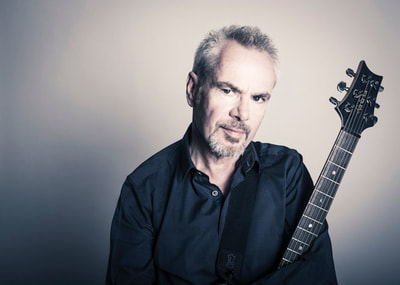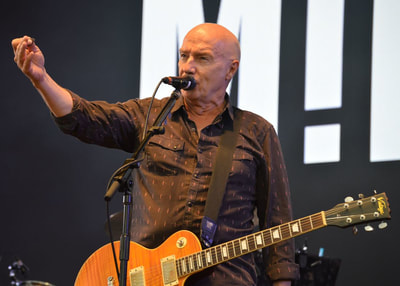|
Consisting of song writer, vocalist and keyboardist Clark Datchler and guitarist, bassist and producer Mike Nocito Johnny Hates Jazz were, in the words of Clark; “the last new electronic band to arise in the eighties”. Scoring a trio of monster hits in 1988 from the album ‘Turn Back the Clock’, they’re one of the most fondly remembered bands of the era. We sat down with Clark at Rewind South in London for a chat about the music, the times, and the end. Turning back the clock; Eamon O’Neill.
Hi Clark, how are you today?
I’m doing very good. I actually made, possibly, quite a mistake by going to a very intense workout at eight o’clock this morning in my local gym, and it absolutely destroyed me, so I’m just recovering now! This was the recovery; doing the performance here! Johnny Hates Jazz music requires that deft touch, so I hope you’ll be ok! Yeah, that’s very true. In a way, that’s true, but actually when you’re out there, it never really feels like that because you come off stage and you’re still outputting a lot of unseen energy. It’s not so much the moving about, it’s more, holding the audience, even for a limited period of time, takes a lot of energy. How did you enjoy your performance at Rewind today? It was a lot of fun. We were on stage for half an hour and we crammed seven quite long songs in, so we had to just go hell for leather. It’s funny because you come off stage and you just want to do it all again. Going back, you were in the band Hot Club with Glenn Matlock from the Sex Pistols; how do you get from punk to Johnny Hates Jazz? I’d love to hear Glenn’s response to that because he was mystified by it! Of course, one of the original members of Johnny Hates Jazz with me and Mike was also in that band with Glenn as well, and James Stevenson from Generation X and Chelsea. You know what, the answer to that is that we listened to everything. We weren’t really concerned with genres of music. If it was a good song, if it was a good production, then we appreciated it, so you know, I love listening to the Pistols - I thought some of their tracks were fantastic - just as much as I loved listening to Steely Dan, so I didn’t see the difference to be honest. You’re one of those bands that scored a huge hit – ‘Shattered Dreams’ – that is instantly identifiable as an eighties classic. It’s quite remarkable, and you never think about the fact that one of your songs is going to have that kind of longevity and still mean a lot to so many people, so I’m quite taken aback that ‘Shattered Dreams’ gets the reaction it does. But I’m very proud of it as well. I think at the time when you’re young and you have that kind of success you probably don’t appreciate it as much as you do when you’re a bit longer in the tooth, and I appreciate it more now. Do you remember writing ‘Shattered Dreams’? I remember writing it very well. I wrote it in my parents’ front room, and my dad who was a very successful jazz musician [Fred Datchler; singer and saxophonist in the Stargazers and the Polkadots] came in as I was writing it, which he never did when I was writing, and he said; “what is that you’re writing?”, and I said; “It’s called ‘Shattered Dreams”. He went quiet and he said; “I think you’ve wrote your first hit”, and to have that from my dad, because he had done so well in music, meant a lot. Aside from the production, the song is not typical of the times; it goes to other places.
The thing about ‘Shattered Dreams’ is that, whenever anyone writes a song, you’re obviously influenced by what you grew up listening to and what meant a lot to you, and I was very, very eclectic, as were the other guys in the band. So, I think it was bound to have a slight difference about it. What sort of influences did you have back then? Well, I didn’t do this consciously, but I was into anything from Stevie Wonder to the Sex Pistols to ABBA to Gino Vannelli who’s this fantastic kind of jazz fusion Canadian artist, so I was into all kinds of things. And then I was very much into ‘Love On Your Side’ by the Thompson Twins; it was the first record that got me into electronic music, heavily. So, I think all of that goes into it in some way. Johnny Hates Jazz fell under the moniker of what’s now referred to as sophisti-pop. Well, it didn’t exist back then! These are all the subgenres that have been created in the intervening years, and yeah, sophisti-pop probably refers slightly to the fact that a lot of bands at that time were in suits and were quite dapper. I think at the end of the day, we were still an electronic band, and we were still synth-oriented, and I still refer to it as that. We were the last new electronic band to arise in the eighties. Yeah, you were relatively late, in that respect. Yeah, ’87, ’88, and then I quit the band, and that’s why it didn’t continue. What was your reason for calling it a day; did you see the changing musical landscape coming? That’s the interesting thing about the ‘90s, and I did see it coming, and I saw that already there was, what I regard as a bit of a trashing of the eighties. It’s hard to imagine that now because the eighties has been revisited and reappreciated by a younger generation, and become very influential, but eighties to nineties it was a bit of a dark time for artists from the eighties. So, that was one factor - I could see the writing on the wall – and I think I also had problems with how Johnny Hates Jazz were promoted in the U.K.; not so much around the world, but in the U.K. especially, we were pointed down the teenage route too much, and that’s not really where we came from, so I jumped ship, probably a bit too early, but I did! Kim Wilde is on the bill today, and she sang backing vocals on the studio recording of ‘Turn Back the Clock’; is there any chance of you reuniting on stage? I actually saw Kim just a few weeks ago at a festival called 80s Classical, and she came up to me and Mike, my colleague in Johnny Hates Jazz, and she said; “do you want me to sing backing vocals on ‘Turn Back the Clock?’, and we both went; “ah…”, and we were thinking of asking her to do that, but Kim was headlining that show, and we were on a little bit before her, and it didn’t feel right that she would come on before her big moment. But we’ll figure out a time to do that, we will. How did Kim Wilde end up on the song in the first place? Well, the member of Johnny Hates Jazz who’s no longer in the band, Calvin [Hayes] was the drummer in Kim’s original band when ‘Kids in America’ came out, so Calvin knew her. Mike, my colleague still to this day, was an engineer at RAK Studios where Kim did all of her recording, so he recorded her, and he had engineered for her, and then I knew here just because I was also a RAK solo artist, so the idea came up and she, in a lovely way, and she is such a lovely person, just said; “yeah, of course”. So, she’s a part of our history now. So that was then, but what are you up to currently?
We love these kind of shows but me and Mike still record. We had an album out in 2020 called ‘Wide Awake’, and I think it’s important to us, ad I think it is to a lot of artists that, you still make new music. Even though it might not be appreciated to the degree your early stuff was, it’s still part and parcel of who you are and what you do. Have you any new releases planed? I’m actually, I’ve got a solo recording of ‘Shattered Dreams’ coming out as a charity record for refugees who are fleeing the Russia / Ukrainian conflict. That’s really just to raise money for a charity in Poland who are giving them sanctuary. So, we are constantly looking and finding things to do that keep us creatively active. Like this interview? Like us on Facebook and follow us on Twitter for regular updates & more of the same. For all things Johnny Hates Jazz, visit the band's official site. |
|
Johnny Hates Jazz
"We were the last new electronic band to arise in the eighties." - Clark Datchler.
© 2016 - 2024 eonmusic.co.ukContact: [email protected]
|




